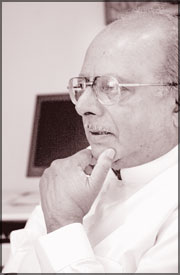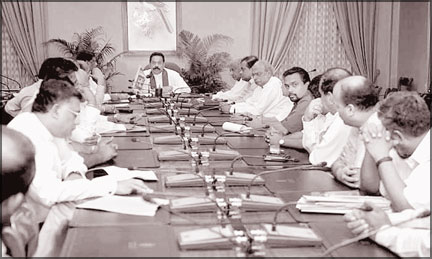Power devolution Towards consensus
 In an interview with Daily News Science and Technology Minister
Prof. Tissa Vitharana, All Party Representative Committee (APRC)
Chairman, explains how the APRC final draft for ‘Power Sharing’ for Sri
Lanka is taking shape with the victories in the military front. In an interview with Daily News Science and Technology Minister
Prof. Tissa Vitharana, All Party Representative Committee (APRC)
Chairman, explains how the APRC final draft for ‘Power Sharing’ for Sri
Lanka is taking shape with the victories in the military front.
Manjula FERNANDO
How close are you in completing the final proposals?
We have extensively discussed all the issues related to a future
power sharing mechanism and there is consensus among the 13 parties
represented in the APRC on 95 per cent of the issues. I am sure within
the next four weeks we could complete the final document. I don’t
believe in reaching 100 per cent consensus on all the issues. That is
impossible.
|

President discussing the APRC progress with party leaders |
My first task is to get the UNP back into the process. Choksy who is
the UNP’s APRC representative has informed us to keep him informed of
the areas of agreement among the parties at the APRC and there will be
an exchange of views from time to time. When the document is completed I
will be inviting the UNP to directly participate and hopefully we will
be able to incorporate their views into the final document.
There is a significant change in the TNA’s attitude towards the LTTE,
any prospects of this group joining the APRC process?
We have reached the final stage of our deliberations. My intention is
to invite all the other political parties including the TNA represented
in Parliament who are currently keeping away to join. We invited them
sometime ago but it was turned down. With Emerging developments I hope
the TNA will play a more positive role in trying to express the views of
the Tamil People, not the views of the ‘separatist LTTE’.
I am glad that TMVP and EPDP are actively involved in the process. I
keep the TULF Leader, PLOTE and the EPRLF P section constantly briefed
of our deliberations and their inputs have been welcomed. It is vitally
important that views of Tamil people are properly accommodated in the
final APRC document.
Political parties representing the Tamil peoples of Indian origin;
the CWC, the Upcountry people’s Front and the Democratic People’s Front
are also in this process. The Muslim segment is represented by the SLMC,
All Ceylon Muslim Congress, NUA and the National Congress. It should be
noted that the SLMC and the DPF are with the Opposition.
With the military victories, will there be any conceptual changes in
the APRC process?
When we started our deliberations the President suggested the
document we present should be a consensus paper which could be used in
future talks with the LTTE. In case the talks do not succeed it should
be a basis for a future constitution for the country.
Now it appears with military victories and lack of desire on the part
of LTTE to engage in meaningful talks to resolve the problem with the
framework of one country, the question of meeting LTTE does not arise
now.
So the whole focus must be on satisfying the needs of the Tamil
people in particular and Tamil Speaking people in general which includes
the Muslims as well. This is what we are trying to achieve in the APRC
process now.
Some minority parties think the military victories will be leverage
for the Sinhala majority to dominate the scene and shadow the chances of
an acceptable political solution?
I would say that there are people who hold that point of view and
imagine that to solve this problem all we require is to be benevolent as
the majority towards the Tamil minority and provide them with their
needs.
But they fail to realise the whole process evolved over the years and
the minority has lost faith now. What they are requesting from us is to
give their leaders a fair share of political power to provide for their
own people. Unless that is done there will be no solution to this
problem.
In their document to the APRC, the TMVP calls for a referendum when
the Eastern provincial council marks two years in office, to find if
people still wanted a divided North and East.
They feel, not enough powers have been given to the provincial
administration. Perhaps they have begun to think it is necessary to have
a stronger combined North and East.
So it is time the Government and the Sinhala majority realize, unless
we have proper devolution of power, the tendency to believe what the
LTTE has been telling is correct, will grow among Tamil people and the
conditions will be created once again for a future Prabhakaran.
Other minority parties express the same view about the North and
East provinces?
All Tamil political parties and the Muslim political parties have
expressed preference for a combined North and East. We can change this
thinking only by adequately devolving power to the separate provinces.
President informed Indian External Affairs Minister that this
political solution will have something more than the 13th amendment, are
you discussing something to this effect?
Our discussions have taken place without basing them on the 13th
amendment. We are trying to avoid the ‘obstacles’ which have
overshadowed proper implementation of the 13th amendment.
One reason why it is not properly implemented is that there is a
large concurrent list of powers where the Central government’s approval
is needed. For example, sharing of water resources, land utilization and
funding etc. All these powers are taken over by the Ministries of the
Central Government.
We have decided to do away with this concurrent list giving clear cut
powers to the Centre and the provinces to act independently without the
interference of each other.
Even in areas such as the Education and Health where provinces have
complete powers, these powers cannot be properly executed since the
funding is strictly determined by the Centre.
Are you confident these proposals will get the Government’s nod?
At the moment practically all the political parties in the
Government, except the MEP and the JHU who are keeping away from the
deliberations at the moment, are in agreement with these proposals.
Would you expect the hardliners like JHU and JVP to join the process
now? Their demand was to crush LTTE militarily and then offer a
political solution.
We will certainly invite those parties to come back to the process.
What will you do after APRC draft of recommendations is completed?
After reaching maximum possible consensus we will present it to the
President. Then it is up to the President to take it up from there.
There has to be substantial changes in the present constitution. To
bring about fundamental changes, meaning to the entrenched clauses, both
two thirds majority in parliament and a referendum will be required.
With regard to other clauses two thirds majority in Parliament will be
adequate.
What is your answer to allegations that APRC is just a talk show?
The representatives of different political parties which included the
parties of the Opposition had 104 sittings over two and a half years.
The average time spent on one session was four hours, sometimes longer.
This has been a very taxing exercise. We had in depth discussions on
every relevant political issue that has every bearing on resolving the
national question. All this had been done without any payment to anyone.
I can say that every member of APRC contributed with a sense of
commitment to try to work out an indigenous solution to our national
problem. This has never been done in the past so effectively. I am
certain this time we will come up with a set of proposals that would
meet the aspirations of the minority and acceptable to a major section
of the majority.
This was exactly the way the problems were successfully settled in
countries like South Africa and Northern Ireland.
How is the response of the International community over your
deliberations?
I have regular briefings every month with the international community
on the APRC proceedings. They are hopeful of a positive outcome.
Especially the US, Japan and India are keeping a close watch.
A large section of Tamil diaspora has been in touch with me. With
very few exceptions most of them have been very appreciative of the APRC
process. But many of them have expressed fear that Sinhala
majoritarianism might ultimately interfere with finding any acceptable
solution. My hope is that this will not be the case.
Do you have a deadline as such?
There was pressure on us in December 2007 because of the
International community’s view the Government has albeit abandoned the
political process and turned course to a military solution. And the
President requested us to come up with a set of proposals.
He wanted us to come up with something that would be implemented
through the present constitution. Hence our interim proposals were
submitted in January 23 last year. But this has not interfered with our
main deliberations.
|





